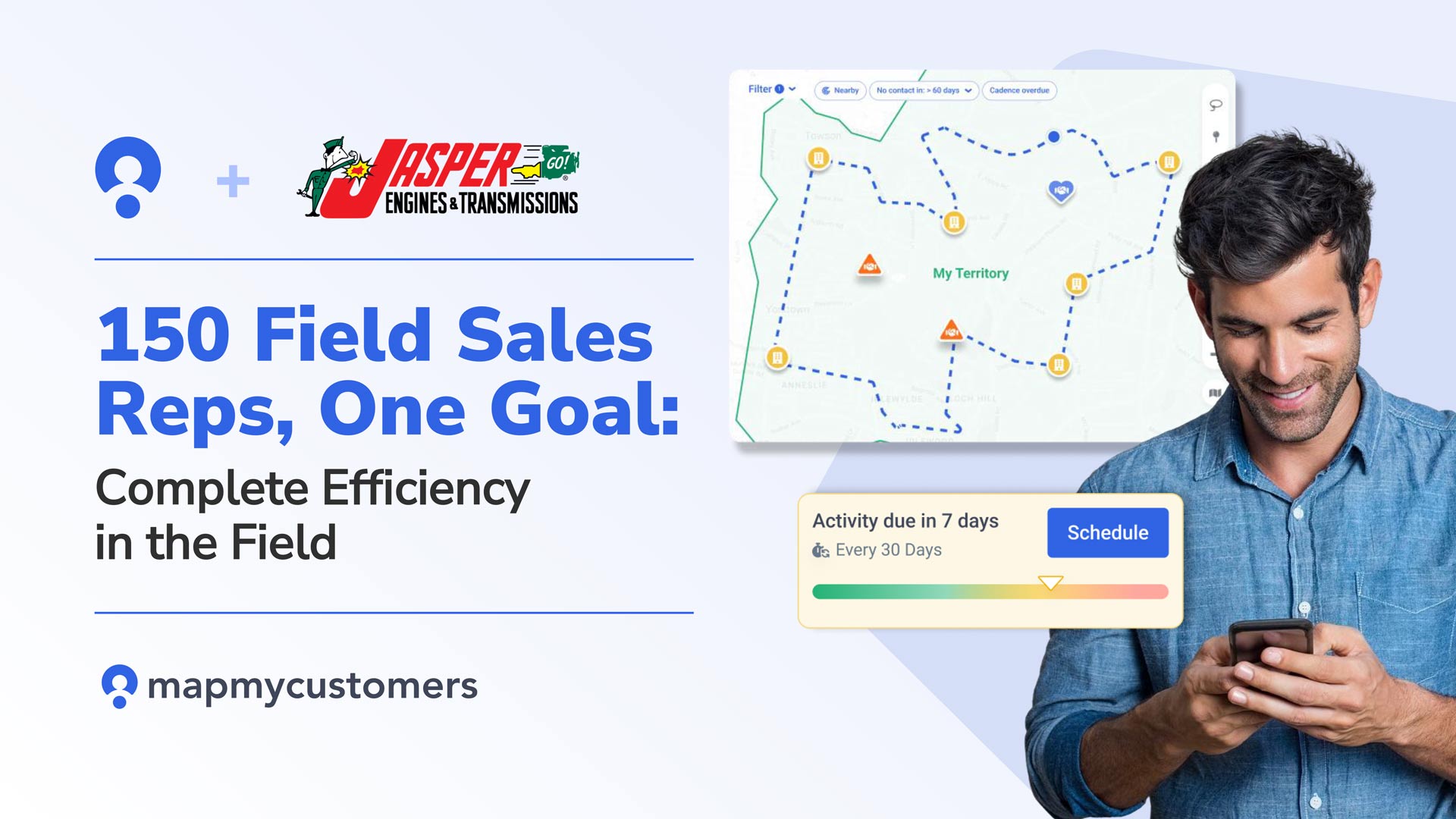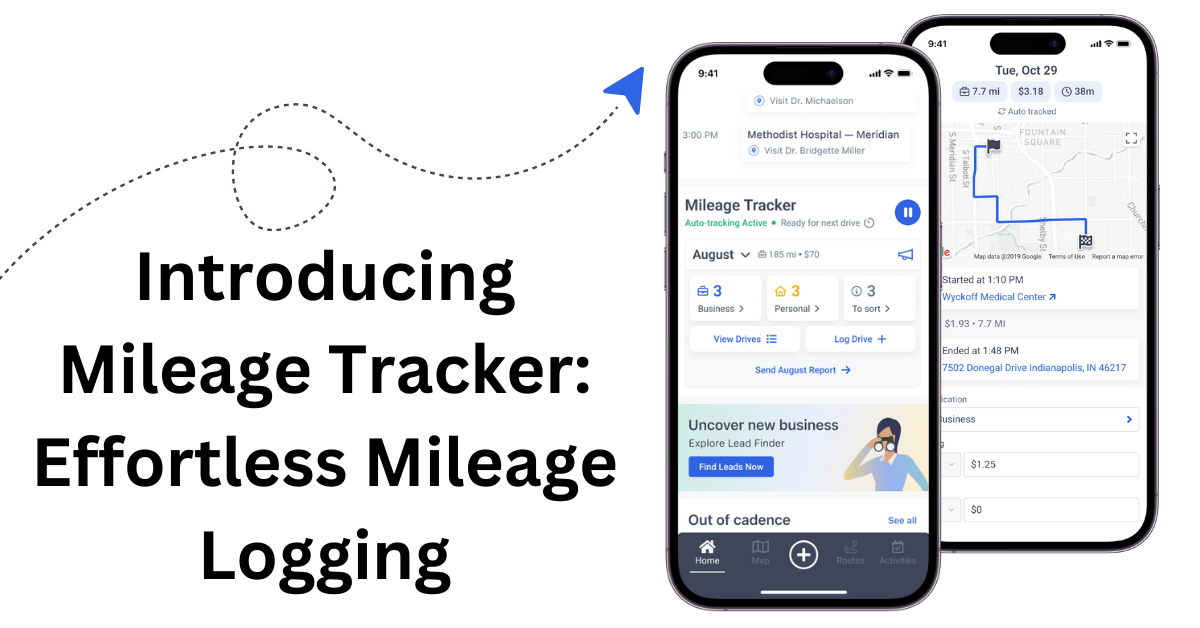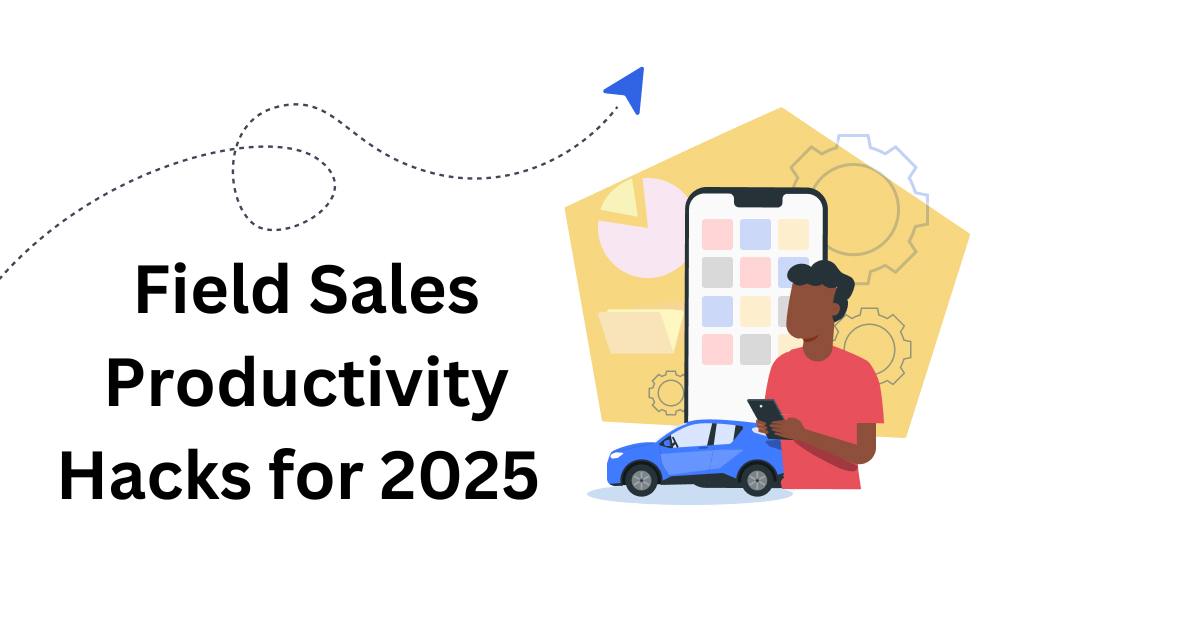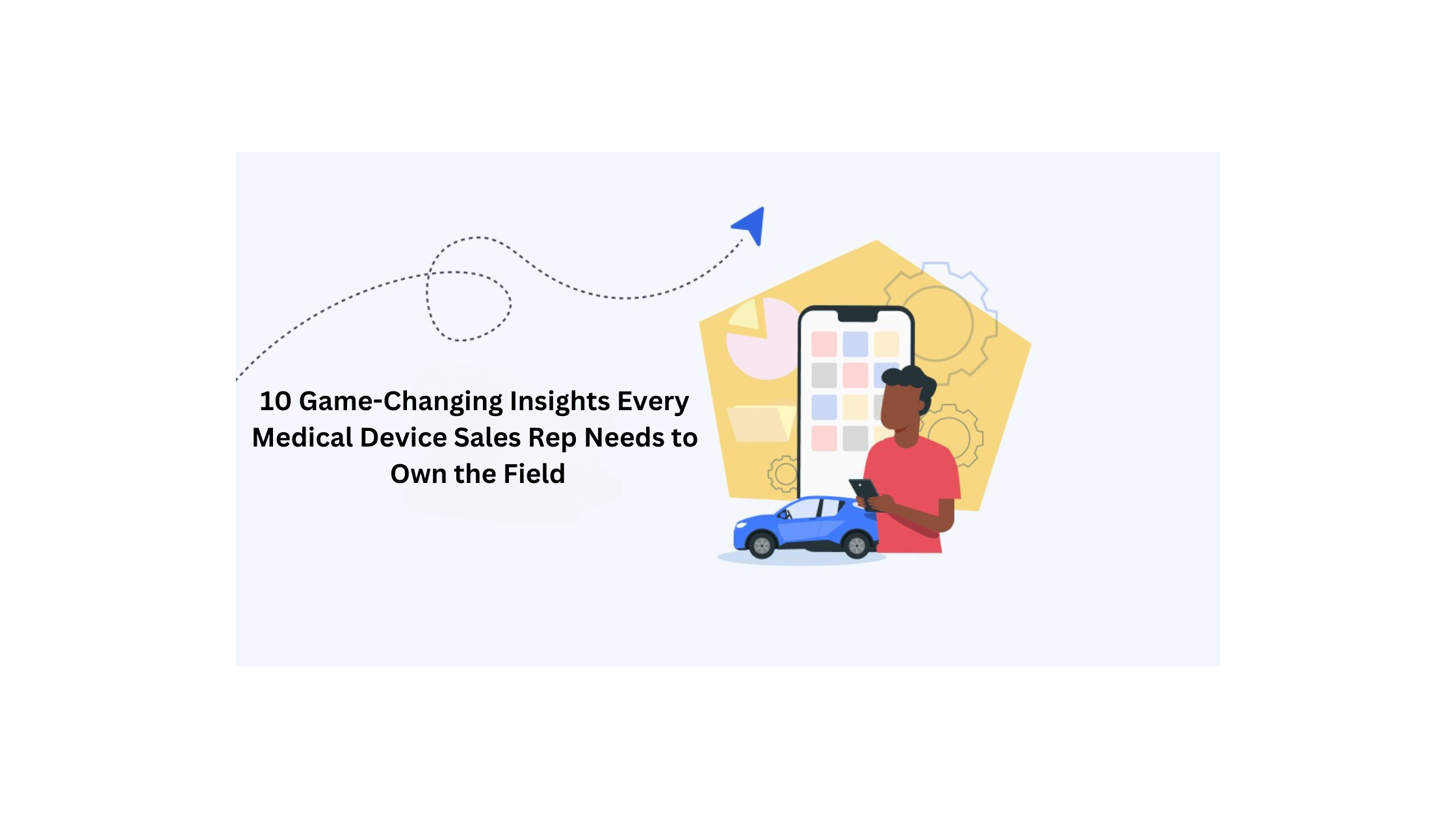
Where you plan to devote your energy and talent for the entirety of your career is no small decision. As you probably already know, not everyone is cut out for a career in sales. The individuals with the talent, dedication, and grit to succeed are highly sought-after, opening up a wide world of options.
Many who have launched their career in door-to-door sales eventually begin to wonder about that world — specifically, the range of opportunities in B2B outside sales. In this post, we’re going to explain the differences between B2C door-to-door sales and B2B outside sales. We’ll address the pros and cons of each, provide tips for how to make the transition to outside sales, and identify several desirable industries to consider.

What Is Door-To-Door Sales?
Door-to-door sales (D2D) is a classic B2C direct sales method where a salesperson walks from house to house in a selected neighborhood, attempting to sell residents merchandise or services. This tactic generally involves (you guessed it) knocking on a prospect’s door, quickly engaging them in conversation, demonstrating or explaining their offering, and hopefully closing a sale on the spot.
D2D selling has been an American institution for a long time. If you grew up in the 50s or 60s, or your parents did, there may still be a leftover relic somewhere in your family home, like a vacuum cleaner or an encyclopedia.
While the age of online selling may make D2D sales seem outdated, it’s still a viable form of person-to-person selling. Granted, the days of a man lugging vacuum cleaners up a front porch in a suburban neighborhood may be in the past. But modern products and services like cable, solar panels, smart home devices, and security systems still leverage D2D sales quite effectively.
Door-to-Door Sales Tips: How To Leverage Software
When practically every prospect has the world at their fingertips, D2D sales reps need to up their game to stay competitive. You might not associate D2D with technology, but there are a number of software options that have brought door-knocking into the digital age.
Some of the benefits of using sales apps and software include:
- Better time management
- Know the best times to visit prospects
- Plan your routes more efficiently
- Track the doors you’ve already knocked on
If you’re looking to supercharge your D2D efforts with sales software, Spotio is a great place to start.
Spotio is a field sales software for sales reps and managers that offers pipelines, autoplays, prospecting, and an activity tracking and reporting dashboard. D2D sales reps can manage territories more efficiently and automate manual tasks. Additionally, Spotio helps you take prospecting to the next level by eliminating unqualified leads and zeroing in on prospects with the best chance of becoming customers.

Spotio services clients in industries such as:
- Home Improvement
- Solar
- Telecom
- Alarm/Security
- Pest Control
- Storm Restoration
What Is Field Sales?
Field sales, or outside sales, is selling a business’s products or services outside the office (or “in the field”). By comparison, inside sales involves selling to customers remotely via phone or email.
Outside sales reps usually travel to offices (and occasionally events like conferences and trade shows) to engage with and pitch potential customers. Most B2B sales require talking to a company’s C-level decision-makers face-to-face and showing your product in person, or via presentation.

Typically, a field salesperson is assigned a specific sales territory, which is defined and assigned by the sales manager. Territories are usually broken out by geography, but they may also be defined in other ways, like industry or account type. The rep is responsible for generating new business and managing existing client relationships within his or her assigned territory.
Like D2D sales, field sales involves a significant amount of travel. But rather than canvassing a residential neighborhood, a field sales rep targeting businesses may be spending much more time behind the wheel, or even in the air.
The Best Software for B2B Outside Sales
Technology plays a key role in the day-to-day of an outside sales reps. In addition to common sales tools like CRM systems, there is software specifically designed for field sales, like Map My Customers.
Map My Customers is a mobile-first, purpose-built tool that can cover all of your automation, visualization, tracking, sales data organization, reporting, and mapping needs in one place. It features a powerful mapping engine that helps visualize opportunities across your territory and create optimized routes, even on the go.

If you’re a field sales manager, Map My Customers also has features that allow sales leaders to easily oversee their team. Managers can track sales communications, visits, and other activities without constantly checking in or micromanaging. Map My Customers can easily connect with your existing CRM system and other tools you use every day, like Google Calendar and Office 365.
Door-To-Door Versus Outside Sales: The Pros and Cons
As you can see, despite existing under the same umbrella, there are some major differences between D2D and outside sales.
It’s worth mentioning that door-to-door sales isn’t for everyone. It’s extremely challenging work in more ways than one. Also, as we mentioned earlier, it isn’t right for every business. If you aspire to work with a B2B product or service, such as software or pharmaceuticals, you will need to transition from D2D sales into a field sales role.
If you’re considering transitioning into field sales from a door-to-door role and you’re on the fence, consider some pros and cons:
Door-to-Door/B2C Sales: Pros and Cons

Pros:
- Great for getting your foot in the door if you don’t have prior sales experience.
- Sales process is often less complicated (you’re selling a straight-forward product or even setting appointments for someone senior to you.)
- Doesn’t require a lot of admin work, like sending emails, making phone calls, planning, and doing follow-up.
- Requires quickly reading and connecting with people, which can build character and teach vital interpersonal skills.
Cons:
- Physically demanding work. It requires hours of walking daily, often in uncomfortable weather conditions.
- You may have to hear “no” many times before making a sale.
- Customers are not expecting you and may have a negative knee-jerk reaction to a stranger at their door.
- Some states have “no solicitation” laws that require obtaining a permit before visiting any house.
- Changing consumer behavior makes cold-knocking more challenging, because many customers are researching and buying online.
- Can be both mentally and physically draining and quickly lead to burnout (especially if you don’t believe in what you’re selling).
Field/B2B Sales: Pros and Cons

Pros:
- Freedom to set your own schedule by contacting prospects directly and scheduling your own appointments.
- Frequent travel means every day is different (58% of outside sales report being in the field for 5 days or more per week).
- Less client visits overall per day.
- Most visits will be return visits to places you already have relationships.
- More independence and autonomy (reps are expected to operate without close supervision).
- More likely to work with high-ticket products at larger companies (for companies with revenues of $500 million or more, 71.2% of their sales force are field reps).
Cons:
- Must have a deep understanding of the products and services you’re selling.
- Requires strong verbal and written communication skills for email and phone follow-ups.
- May require a little more experience and/or education.
- Sales cycle is longer and more complex, so losing a sale could mean weeks or months of lost time.
- Requires a lot of driving (reps report spending an average of 22 hours a week behind the wheel).
Field Sales Career Path: Tips for Transitioning to Outside Sales
Being in outside sales is similar to owning your own business because, for the most part, you call the shots. You supervise yourself, own your accounts, set your own schedule, and develop your own strategy. Over a long sales career, shifting to field sales is a natural transition.
Thinking about making the move to outside sales? Here are a few tips to get you on the right path.
Focus On Relationship-Building
Field sales is about more than just prospecting; relationship-building and customer retention is equally important. Your daily interactions will be devoted to nurturing current customer relationships as well as finding new ones. This requires establishing trust, demonstrating strong communication skills, and just generally showing clients they matter. Check out our post to brush up on strategies to create customer relationships that last.
Pursue Meaningful Credentials And Certifications
Earning sales-related credentials sends a loud and clear message to a hiring manager: I’m committed to learning and to my profession. There are industry-specific certifications for sales professionals, and self-paced online learning programs from platforms like LinkedIn and Hubspot. If you’re neck-and-neck with another candidate with similar experience, certification from a reputable association or training program gives you an edge.
Get Tech-Savvy
According to a PayScale survey, having technical sales knowledge can increase a field sales rep’s salary by 24%. Sales technology helps reps automate routine tasks, increase productivity, improve time management, and boost performance. Mobile-first sales enablement tools like Map My Customers can even help optimize sales routes and identify new prospects on the road.

Brush Up On Time-Management Skills
The top sales professionals are masters of time management. A typical day in the life involves a variety of sales activities like visits, emails, and phone calls, not to mention route-planning and prospecting. A rep who can discipline themselves to plan regularly and stay on task will always outperform someone flying by the seat of their pants.
Seek Out A Mentor
If you do what successful reps do, you can get what they have. Makes sense, right? Find a rockstar outside sales professional and offer to buy them a coffee, or shadow them on the job if possible. You’ll find one who is more than willing to share their experience and teach you the ropes.
Find tips for success and learn more about what it’s like to be an outside sales rep here.
The Best Industries For An Outside Sales Career
Outside sales skills are pretty universal, but if you’re planning for the long haul, what you’re selling and who you’re working for matters. Once you’ve decided to make your move, pause to think about what industry you’d like to break into and then research, research, research! Making a big career change is the time to ask yourself important questions about what you really want.
A few industry options stand out as strong paths into a successful career in outside sales. Here’s what they are and what they do.
Pharmaceutical Sales

It’s projected that global sales of pharma products will reach $1.4 trillion by 2026. Pharma sales reps sell new prescription medications and pharmaceutical products to doctors, pharmacists, and healthcare facility managers. They may also attend conferences or conduct educational sessions for healthcare professionals.
Medical Device Sales
The medical device market is expected to reach $603.5 billion in 2023, and according to research by MedReps, the average total compensation for medical sales reps is $149,544. Medical device sales reps act as a liaison between medical device companies and hospitals. They inform health care professionals of their options for medical devices and help them choose the right ones for their patients.
Get our tips for how to get started in medical devices sales here.
Software Sales
Online computer software is a $564 billion market. Software sales reps explain and sell software to businesses. Prospects may range from tech novices to highly tech-savvy professionals. Reps give product demonstrations, answer questions, and explain how the technology can help improve business operations.
Building Materials Sales

The global building materials market is expected to exceed $222 billion by 2026. Reps in this industry sell commercial building materials to customers for construction projects. Like the other options we discussed, the most successful reps are knowledgeable about the industry challenges their prospects face. In this case, that would include labor, insurance costs, OSHA, and the local market.
Achieve Career Growth in Field Sales
If you’ve mastered the art of door-to-door sales and are ready to take your career to the next level, a transition into B2B outside sales is a logical next step. From pharma to tech to construction, there are a number of exciting and lucrative industries to explore. While it may take time and persistence to land the position of your dreams, the benefits and opportunities are worth the effort.





